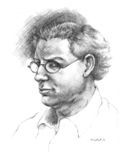Daniel Coleman on the Complexities, Labour, and Reward of a Connection to the Land
Yardwork: A Biography of an Urban Place (Wolsak & Wynn) by Daniel Coleman examines a theme that is both timely and timeless - the question of place and belonging. How do newcomers relate to an existing culture in what becomes their home? Is it possible to deeply and respectfully connect with the land as a settler? Weaving in his personal experiences working in his Hamilton garden, Coleman asks these complex questions with an open mind and heart. He uses his garden as a sort of case study, situating it in the complicated history of Cootes Paradise. He includes the perspectives and history of the Six Nations to create a book that is both large in scope and intimate in tone - and one that any avid gardener will enjoy.
We're pleased to welcome Daniel to Open Book today to participate in our Entitled interview series, which focuses on the magic and importance of book and story titles.
Daniel tells us about a friend with a very helpful suggestion, shares a fantastic title from an Australian memoir, and gives us a peak at some of the working titles that existing along the way for Yardwork.
Open Book:
Tell us about the title of your newest book and how you came to it.
Daniel Coleman:
I was sweating over the keyboard one afternoon, trying to massage a paragraph to make it more limber and sprightly, when I realized I was working just as hard as when I had been laying the flagstone patio in the backyard earlier that day. And it hit me: the work of paying attention to the land on which we live is a mental and physical labour, which, like putting down patio stones, is good exercise, puts us in touch with the earth itself, and teaches us new skills – not to mention new muscles that we haven’t been using.
A friend of mine had listened to me talk ad nauseum about the writing I had been doing for some years about our yard here in Hamilton at the Head of Lake Ontario, and he said, “Why not call this new book Yardwork?” I thought he hit it right on: it takes work to retrain our Western, Enlightenment minds to consider the many forms of sentience and liveliness that are making their own decisions and working out their lifeways in any urban plot like ours right here in one of Canada’s most polluted cities. And this is what the book is about: the new kinds of awareness settler Canadians are needing to learn if we are to live in good relations with the ecologies and the Indigenous neighbours who have dwelt in these places for centuries.
OB:
What, in your opinion, is the most important function of a title?
DC:
It should give you a doorway into the project and then cause you to catch your breath on the way out of it. It should be a word or phrase that catches your interest by being just enough aslant of regular usage that you are intrigued to pick up the book in the bookstore or order it online. The best titles capture the gist of the book, so that they give you a flash of delight and surprise when you turn the last page, put your hand on the door knob to depart this reading and realize, “That title captured everything I learned here, in one tight phrase.” A great title lets people talk about the book and convey what it’s about just by saying its name.
OB:
What is your favourite title that you've ever come up with and why? (For any kind of piece, short or long.)
DC:
White Civility, because it gets to the heart of my book on the particular form of British, gentlemanly white superiority that shaped English Canada’s self-image from Confederation onwards. I was writing that book for five years before the penny dropped on what it was about and these two words crystallized in my mind. I no longer remember what transpired at that moment to bring it into focus. I love others of my book titles, such as In Bed With the Word and The Scent of Eucalyptus, but those are a bit more wordy than White Civility.
Your CanLit News
Subscribe to Open Book’s newsletter to get local book events, literary content, writing tips, and more in your inbox
OB:
What about your favourite title as a reader, from someone else's work?
DC:
Mem Fox’s Dear Mem Fox, I Have Loved All Your Books, Even the Pathetic Ones (1992), a reading memoir by the much-loved Australian children’s author. It’s way too long, but it certainly gets your attention!
OB:
Did you consider any other titles for your current book and if so what were they? Why did you decide to go with the title you eventually picked?
DC:
Yes, I waffled about titles considerably over the course of writing this book. Many were variations on this one: Inhabiting Here: A Biography for a City Backyard. I played with words such as dwell, inhabit, living and other ones such as location, place, and spot. I wondered if story or stories were better than biography. But I liked the work of Yardwork and the everyday feeling of it—the idea that paying attention and caring about a place involves work. And I liked the sense that it’s worth recording (graphe, writing) the life (bios) of any place, even an ordinary back yard in an ordinary city. You don’t have to be in a celebrity place in order to devote your care and respect to it.
OB:
What are you working on now?
DC:
I don’t like to say too much about next projects because they keep changing as I write them, and whatever I say today might be pretty far off what they eventually become. I’ve been doing research on the Two Row Wampum-Covenant Chain treaty between the Haudenosaunee and the Dutch in the early seventeenth century. I’ve published a few scholarly articles out of this work and have been involved in a Two Row Research Partnership project with Deyohahá:ge: Indigenous Knowledge Centre over the past five years. So I’m curious to see what kind of book project is growing out of these activities.
________________________________________
Daniel Coleman was born and raised the child of Canadian missionary parents in Ethiopia, an experience he has written about in The Scent of Eucalyptus: A Missionary Childhood in Ethiopia. He moved to the Canadian prairies in the 1980s and completed his PhD in Canadian Literature at the University of Alberta in 1995. He went on to publish scholarly books on Canadian immigrant writing and on how Canada became a white, British place. Since 1997, he has lived in Hamilton, Ontario, where he teaches Canadian Literature at McMaster University.
*Author portrait by Michael Gallant

